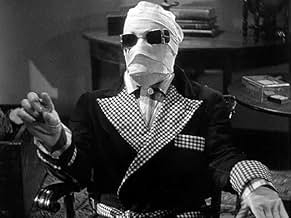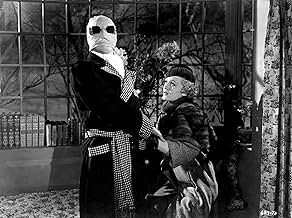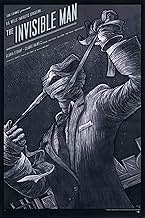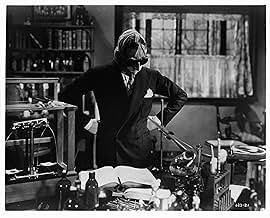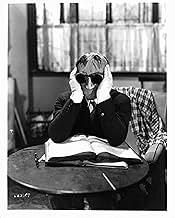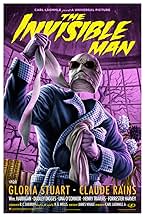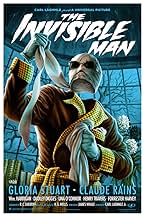CALIFICACIÓN DE IMDb
7.6/10
42 k
TU CALIFICACIÓN
Un científico encuentra la forma de ser invisible, pero al hacerlo se vuelve loco.Un científico encuentra la forma de ser invisible, pero al hacerlo se vuelve loco.Un científico encuentra la forma de ser invisible, pero al hacerlo se vuelve loco.
- Dirección
- Guionistas
- Elenco
- Premios
- 4 premios ganados y 2 nominaciones en total
Robert Adair
- Detective Thompson
- (sin créditos)
Edgar Barrier
- Radio Announcer
- (sin créditos)
Ted Billings
- Villager Playing Darts
- (sin créditos)
Walter Brennan
- Bicycle Owner
- (sin créditos)
Robert Brower
- Farmer
- (sin créditos)
Mae Bruce
- Mary Purdy
- (sin créditos)
Opiniones destacadas
Claude Rains. The man. The myth. The legend. You cannot talk about this film, whether in conversation or in any review, without placing this actor on the tip of your tongue. He is the epitome of the madness that surrounded the power-hungry Invisible Man. In this day of modern cinematic wonder, most full-fledged actors would want their faces to be in front of the camera, showcasing the entire film. Directors would want this fledgling star to promote their film, get kiddies interested in spending their money, and for financiers to see the profits of their contributions. Let's face it, if Brad Pitt is in a movie, typically most audience members are actually going to "see" Brad Pitt. Thankfully, we have directors like James Whale and his interpretation of H.G.Wells' classic The Invisible Man. Whale took a powerful story, expanded it, breathed life into it, and followed up with quite possibly one of the most sinister villains in movie horror history since Hannibal Lector. He is crude, he is heartless, and he wants nothing more than world domination
he is Claude Rains
and yet, until the end of the film, we never see the white's of his eyes.
There are several reasons why I just fell in love with this film, outside of the cataclysmic performance of Claude Rains. Ohhhh, Claude Rains. I loved the way that this movie was filmed. I loved the scope of the Invisible Man's terror. Whale could have kept his antagonist to committing just single murders of friends and family, he could of just kept it confined to just one single town, he could have kept our focus directly on the turmoil of Rains, but instead, he decided (amazingly!) to open the entire can of worms with success. When I first began this film I was expecting the classic images of angry villagers with pitchforks storming the house that the Invisible Man lived within, but instead, Whale gave us this sort of random chaos that truly created fear around this character. Whale is able to give us the true terror of this madman by perhaps expanding his budget and showing us how big the terror of the Invisible Man is. For example, I never foresaw the horrific train accident, nor the random worker push off the mountain, and when Rains explained to Kemp what the human impact of falling down a ravine would be like, it literally sent shivers down my spine. Whale created a madman better than some modern horror films could ever accomplish.
For a film created in the 1930s, the special effects were spectacular. Sure, CGI was just a glimmer in Lucas' mother's eyes, but James Whale did a superb job of giving us these rare glimpses into the future of special effects. The way that he created the Invisible Man surprised me. I did not expect to ever see the creature without his bandages on, but within ten minutes we are shown the full scope of Whale's creativity. I thought the use of snow, dust, and even the early stages of the overused "green screen" was original for its time. To see Rains smoke as the Invisible Man put a smile on my face. This is a perfect example of a film that used just enough special effects, in the right way, to make the audience forget for a brief time that this was in fact a film not real life. While the special effects did have one or two flaws (see the Invisible Man riding the stolen bike were those wires?), I must credit Whale for pushing the envelope for the time. It was surprising to see such quality from such an older film.
If there would be anything that I would change about this film would be the subtext concerning the relationship between Rains and Flora (played by Titanic star Gloria Stuart). I thought this was nearly unnecessary. I understand the value of trying to give a human element to this monster, but I thought that it could have been done without these random scenes. There wasn't really any connection between the two, and we were left with very little information of them prior to the start of the film. Perhaps if there had been a stronger pre-story it would have congealed better. The same can be said for the chemistry and reasonings for the plot points surrounding Rains and Kemp. I could understand why they occurred during the film, but there had to be something more prior to the opening scene. I wanted to know more. I think that is a good sign for a film, when you are left wondering what was the story before this one and even what was it afterwards.
Overall, I thought this was an exceptional film. I now have this newfound respect for Claude Rains, a man I knew nothing about prior to watching this film. He carried this film and honestly successfully pulled off one of the most frightening madmen this world has ever seen. I think what scared me the most about him was the fact that he actually, unlike some villains, actually followed through with his vile plans. He was evil, whether the invisibility did it or not, he was pure evil, and I loved every minute of it. The special effects were delightful, with a small subplot that this picture could have gone without. Amazing, and a perfect treat before Halloween!
Grade: ***** out of *****
There are several reasons why I just fell in love with this film, outside of the cataclysmic performance of Claude Rains. Ohhhh, Claude Rains. I loved the way that this movie was filmed. I loved the scope of the Invisible Man's terror. Whale could have kept his antagonist to committing just single murders of friends and family, he could of just kept it confined to just one single town, he could have kept our focus directly on the turmoil of Rains, but instead, he decided (amazingly!) to open the entire can of worms with success. When I first began this film I was expecting the classic images of angry villagers with pitchforks storming the house that the Invisible Man lived within, but instead, Whale gave us this sort of random chaos that truly created fear around this character. Whale is able to give us the true terror of this madman by perhaps expanding his budget and showing us how big the terror of the Invisible Man is. For example, I never foresaw the horrific train accident, nor the random worker push off the mountain, and when Rains explained to Kemp what the human impact of falling down a ravine would be like, it literally sent shivers down my spine. Whale created a madman better than some modern horror films could ever accomplish.
For a film created in the 1930s, the special effects were spectacular. Sure, CGI was just a glimmer in Lucas' mother's eyes, but James Whale did a superb job of giving us these rare glimpses into the future of special effects. The way that he created the Invisible Man surprised me. I did not expect to ever see the creature without his bandages on, but within ten minutes we are shown the full scope of Whale's creativity. I thought the use of snow, dust, and even the early stages of the overused "green screen" was original for its time. To see Rains smoke as the Invisible Man put a smile on my face. This is a perfect example of a film that used just enough special effects, in the right way, to make the audience forget for a brief time that this was in fact a film not real life. While the special effects did have one or two flaws (see the Invisible Man riding the stolen bike were those wires?), I must credit Whale for pushing the envelope for the time. It was surprising to see such quality from such an older film.
If there would be anything that I would change about this film would be the subtext concerning the relationship between Rains and Flora (played by Titanic star Gloria Stuart). I thought this was nearly unnecessary. I understand the value of trying to give a human element to this monster, but I thought that it could have been done without these random scenes. There wasn't really any connection between the two, and we were left with very little information of them prior to the start of the film. Perhaps if there had been a stronger pre-story it would have congealed better. The same can be said for the chemistry and reasonings for the plot points surrounding Rains and Kemp. I could understand why they occurred during the film, but there had to be something more prior to the opening scene. I wanted to know more. I think that is a good sign for a film, when you are left wondering what was the story before this one and even what was it afterwards.
Overall, I thought this was an exceptional film. I now have this newfound respect for Claude Rains, a man I knew nothing about prior to watching this film. He carried this film and honestly successfully pulled off one of the most frightening madmen this world has ever seen. I think what scared me the most about him was the fact that he actually, unlike some villains, actually followed through with his vile plans. He was evil, whether the invisibility did it or not, he was pure evil, and I loved every minute of it. The special effects were delightful, with a small subplot that this picture could have gone without. Amazing, and a perfect treat before Halloween!
Grade: ***** out of *****
Oh! What a wonderful film! The Invisible Man is fraught with witty dialogue, excellent character acting, inventive and creative special effects, insightful direction, and solid, tight scripting. The story is about a scientist that develops a serum which turns himself invisible, for good intent initially. The serum has negative side effects, one of which is turning the scientist into a raving,mad megalomaniac bent on conquering mankind and the world. What is most surprising about the film is its rather perverse sense of black humour(a James Whale specialty) and its cruelty. The Invisible Man is not a benign horror monster but rather a frightening, destructive force capable of acts of violence, madness, and viciousness. The direction is the real star of the film as Whale combines script, acting, mood, and setting amidst the background of ground-breaking special effects that are still impressive to this day. Whale laces his special humour throughout, and this film has no shortage of dark comedic moments. The acting all around is very good with people like Henry Travers, Gloria Stuart, Una O'Connor and William Harrigan especially as a jealous doctor giving all the support they can to a formless Claude Rains. Rains's voice is magnificent and one senses he was made to play the part that would make him famous. Look for Dwight Frye in a small role. A wonderful film experience!
What you really have to appreciate here is Rain's performance in the title role. Using very little more than just his voice, Rains made this character completely believable, even as the character declined into a state of madness. The special effects may not be quite up to today's standards, but they still come off pretty well, which is remarkable given the amount of time that has passed. This is one of those films that could not be changed without diminishing it. It is a real must-see for anyone interested in either the horror or sci-fi genres.
Writing about 30's Black-And-White movies can be difficult, as they need to be considered in light of the era the films were made. You have to adopt the mind-set of some-one viewing it for the first time, without the baggage of umpteen remakes and special effects improvements, to remain objective. Here goes:
Claude Rains does a good job with a mainly "speaking" part - lots of emotion and command there. Una O'Connor as the Innkeepers wife does a bit too much shrieking for my liking - but required "reaction" acting fodder for the time, I assume.
The effects still hold up, and must have been cutting edge at the time. The storyline covers all the basics of the Wells Novel - a quest for knowledge and power, alienation and drug inducessed madness. It's an enjoyable watch with good pacing and steady performances throughout. A sort of lazy Sunday afternoon type of movie.
Universal's take on a British Pub raises a smile, with some fantastic looking weathered-faced locals populating the place. I love the way the gag with a local "fake-playing" a coin driven piano gets a roaring laugh (as if that's the first time the pub's drinkers have seen it). However, the British film-industry was putting out the same type of stereotypes, so Universal can be forgiven there.
A part of Sci-Fi/Horror movie making history, and worth watching for this fact alone.
Claude Rains does a good job with a mainly "speaking" part - lots of emotion and command there. Una O'Connor as the Innkeepers wife does a bit too much shrieking for my liking - but required "reaction" acting fodder for the time, I assume.
The effects still hold up, and must have been cutting edge at the time. The storyline covers all the basics of the Wells Novel - a quest for knowledge and power, alienation and drug inducessed madness. It's an enjoyable watch with good pacing and steady performances throughout. A sort of lazy Sunday afternoon type of movie.
Universal's take on a British Pub raises a smile, with some fantastic looking weathered-faced locals populating the place. I love the way the gag with a local "fake-playing" a coin driven piano gets a roaring laugh (as if that's the first time the pub's drinkers have seen it). However, the British film-industry was putting out the same type of stereotypes, so Universal can be forgiven there.
A part of Sci-Fi/Horror movie making history, and worth watching for this fact alone.
James Whale is, for good reason, most famous for his Frankenstein films. However, better than both (albeit marginally) is this film - The Invisible Man. When I first saw this, I couldn't believe that it's over seventy years old and upon a second viewing; the film just gets better and better. Considering the time in which it was made, The Invisible Man is one of the most amazing films of all time. The special effects are what really make the film. CGI has pretty much spoilt this sort of reaction to a movie. The Invisible Man really has that 'how did they do it?' feel, which movie audiences of yesteryear so often enjoyed, and it's done such a good job with it that I'm still wondering today. The plot gives way to lots of trickery and visual magic as it follows a mad scientist who has turned himself invisible. However, things aren't so simple because one of the drugs he used has properties that can turn a man insane; and this side of the drug has had a huge effect on our man. Believing he can take over the world, he recruits the help of one of his fellow scientists and sets about a reign of invisible terror.
You would think that it would be hard to convince an audience that one of your characters is invisible; but Whale makes it look easy! Claude Rains spends much of the film either under the cover of bandages or not even in it, but it doesn't matter because it's not him but his voice that makes the performance. The fiendishness of his voice is compelling and pure evil, and I don't believe that there is a better man in existence for this role. There isn't a lot of physical acting for him to do, but this is made up for with a dazzling array of special effects. We get to see a shirt move on it's own, things fly around rooms and havoc is caused. It really shows Whale's genius to pull this off. Whale is best known as a horror director, but it's obvious that he has a great respect for comedy also as his Frankenstein films were very tongue-in-cheek, and so is this film. The scenes that see the invisible man causing mayhem are hilarious, and will delight anyone who sees the film. Whale's ability to entertain is absolute, and that is why the films he made for the studio were always the biggest successes. The Invisible Man is one of the greatest achievements in cinema history, and anyone who tells you otherwise is wrong!
You would think that it would be hard to convince an audience that one of your characters is invisible; but Whale makes it look easy! Claude Rains spends much of the film either under the cover of bandages or not even in it, but it doesn't matter because it's not him but his voice that makes the performance. The fiendishness of his voice is compelling and pure evil, and I don't believe that there is a better man in existence for this role. There isn't a lot of physical acting for him to do, but this is made up for with a dazzling array of special effects. We get to see a shirt move on it's own, things fly around rooms and havoc is caused. It really shows Whale's genius to pull this off. Whale is best known as a horror director, but it's obvious that he has a great respect for comedy also as his Frankenstein films were very tongue-in-cheek, and so is this film. The scenes that see the invisible man causing mayhem are hilarious, and will delight anyone who sees the film. Whale's ability to entertain is absolute, and that is why the films he made for the studio were always the biggest successes. The Invisible Man is one of the greatest achievements in cinema history, and anyone who tells you otherwise is wrong!
¿Sabías que…?
- TriviaOn the DVD short documentary, Claude Rains' daughter Jessica Rains tells of a time when her father brought her to see a re-release of this movie in the theater in Pennsylvania in 1950. It was bitterly cold and his face was completely covered by a hat and scarf. When he spoke to ask for the tickets, the attendant immediately recognized his voice and wanted to let them in for free. Rains was quite upset at this and demanded that he pay full price.
- Errores(at around 2 mins) Though the music at the pub comes from a coin-operated player piano, it, along with everyone talking in the pub, stops short at the startling arrival of the Invisible Man.
- Citas
The Invisible Man: We'll begin with a reign of terror, a few murders here and there, murders of great men, murders of little men - well, just to show we make no distinction. I might even wreck a train or two... just these fingers around a signalman's throat, that's all.
- Créditos curiososClaude Rains is the only actor in the film whose character is identified in the credits. The roles the other actors play are not identified, even though the cast is listed twice: at the beginning and at the end. Rains is billed as "The Invisible One" in the opening credits and as "The Invisible Man" in the closing credits.
- Versiones alternativasWhen the film was released to home video, Universal Studios replaced a snippet of music heard on the radio when Dr. Kemp is reading a newspaper in his house, and the Invisible Man enters through a set of French doors. Universal was unable to secure the rights for the original music and replaced it, covering the original sound effects (the sound of the newspaper and the door latch) in the process. The original music and missing sound effects were restored to the 2012 blu-ray audio.
- ConexionesFeatured in Sherlock Holmes y la voz del terror (1942)
Selecciones populares
Inicia sesión para calificar y agrega a la lista de videos para obtener recomendaciones personalizadas
- How long is The Invisible Man?Con tecnología de Alexa
Detalles
- Fecha de lanzamiento
- País de origen
- Sitio oficial
- Idioma
- También se conoce como
- The Invisible Man
- Locaciones de filmación
- Productora
- Ver más créditos de la compañía en IMDbPro
Taquilla
- Presupuesto
- USD 328,033 (estimado)
- Total a nivel mundial
- USD 27,105
- Tiempo de ejecución1 hora 11 minutos
- Color
- Relación de aspecto
- 1.37 : 1
Contribuir a esta página
Sugiere una edición o agrega el contenido que falta

Principales brechas de datos
What is the Japanese language plot outline for El hombre invisible (1933)?
Responda


